Employability Skills Report: Importance for Graduates and Employers
VerifiedAdded on 2020/10/05
|10
|3130
|297
Report
AI Summary
This report delves into the critical realm of employability skills, analyzing their significance for both graduates and employers in today's competitive job market. It begins by defining employability skills as a combination of technical knowledge, soft skills, and the ability to apply them effectively. The report emphasizes the need for graduates to develop these skills to remain competitive and achieve their career goals, including communication, teamwork, leadership, critical thinking, self-motivation, IT knowledge, ethical behavior, problem-solving, time management, multitasking, and personal development. From an employer's perspective, the report identifies critical thinking, problem-solving, and organizational skills as highly valued attributes. The report also introduces Gibbs' reflective learning model to help graduates continuously improve. The report concludes by summarizing the importance of these skills for career advancement and offers a self-assessment framework for graduates to identify areas for improvement, ultimately preparing them for success in their professional journeys.
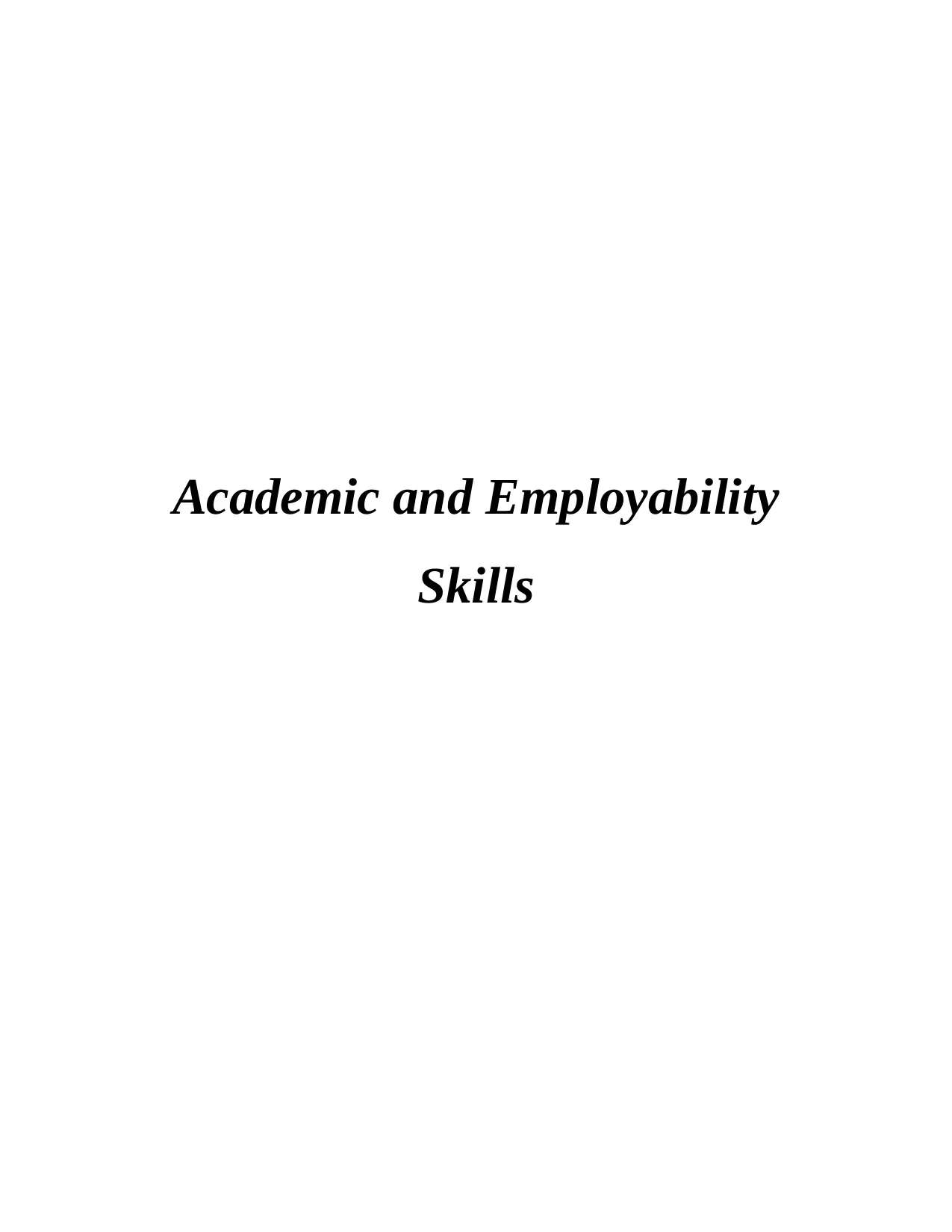
Academic and Employability
Skills
Skills
Paraphrase This Document
Need a fresh take? Get an instant paraphrase of this document with our AI Paraphraser
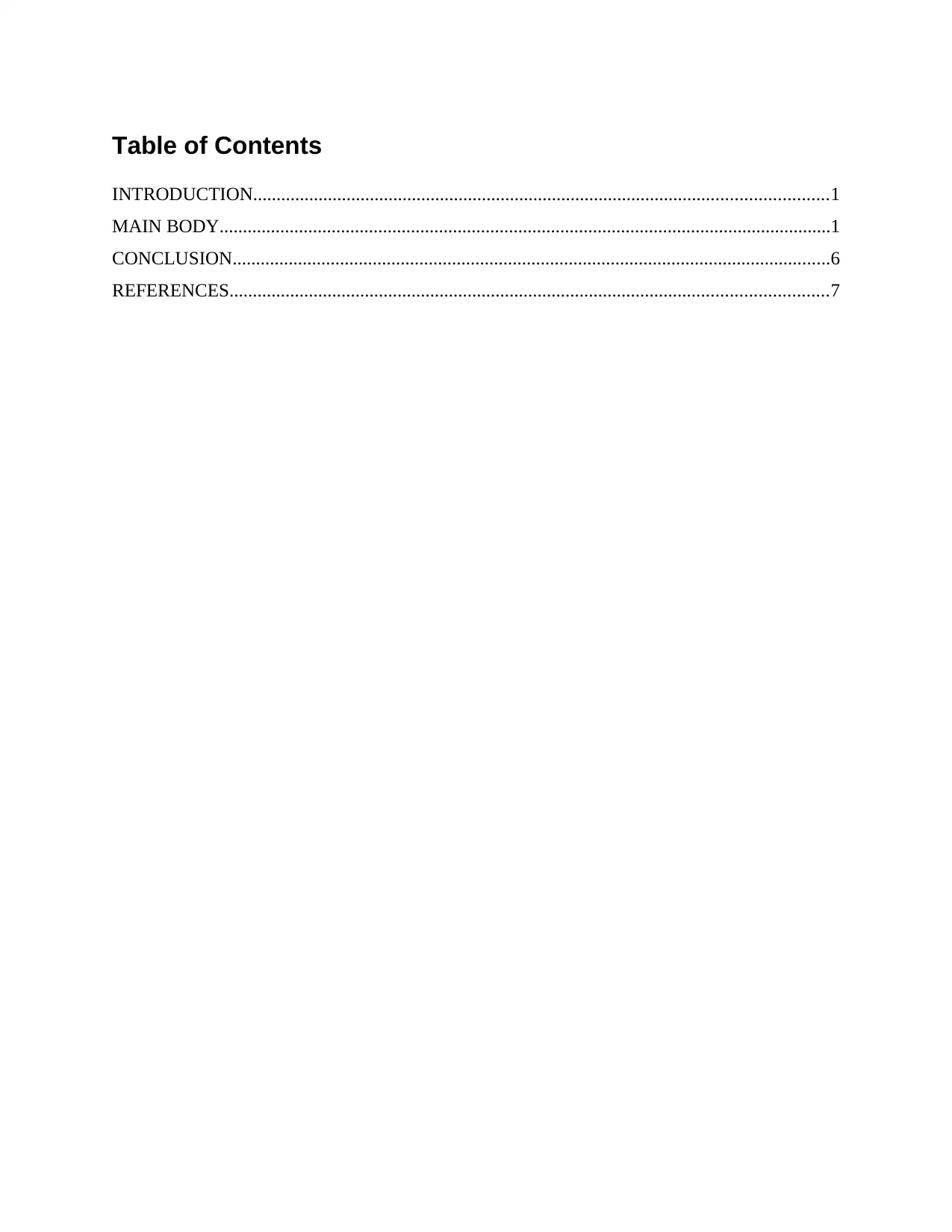
Table of Contents
INTRODUCTION...........................................................................................................................1
MAIN BODY...................................................................................................................................1
CONCLUSION................................................................................................................................6
REFERENCES................................................................................................................................7
INTRODUCTION...........................................................................................................................1
MAIN BODY...................................................................................................................................1
CONCLUSION................................................................................................................................6
REFERENCES................................................................................................................................7
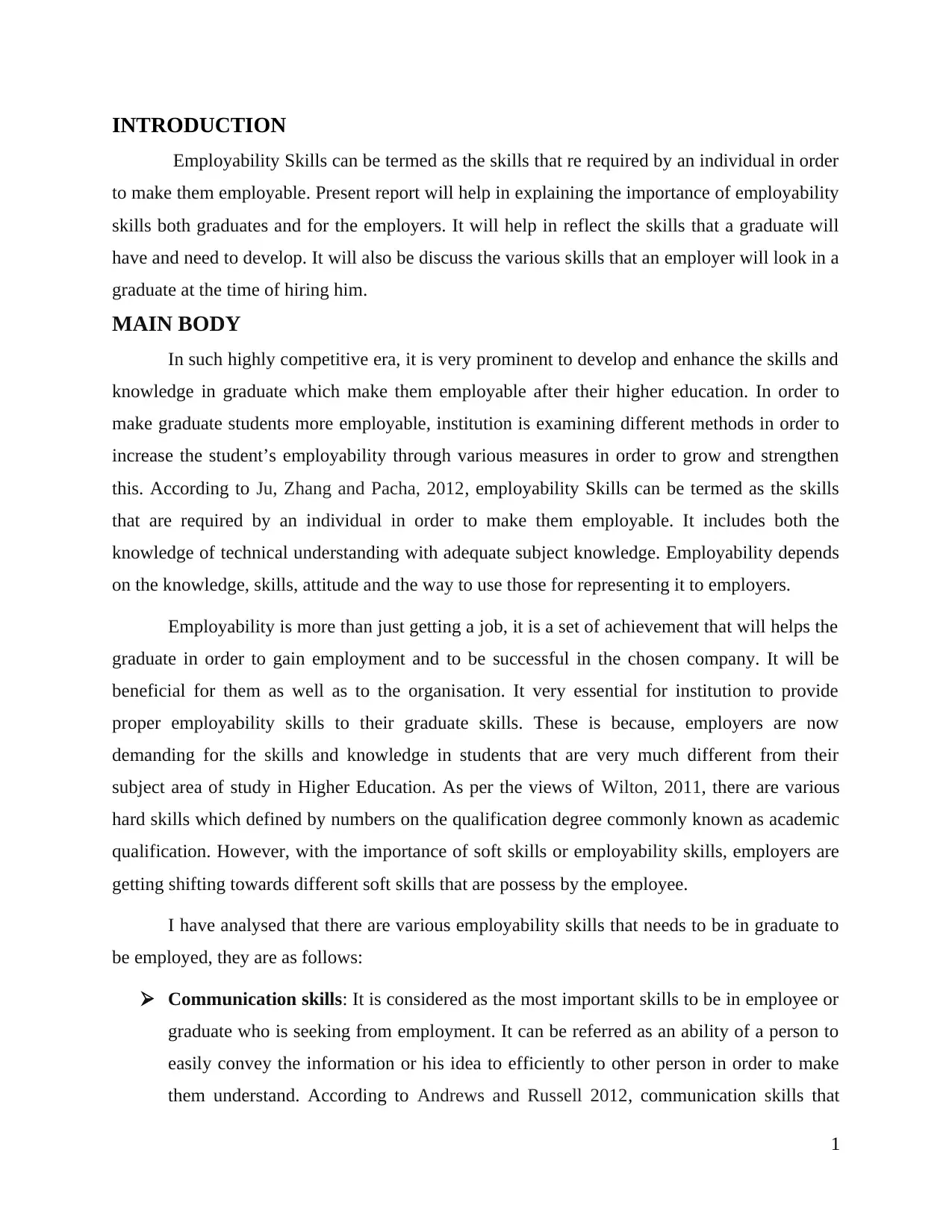
INTRODUCTION
Employability Skills can be termed as the skills that re required by an individual in order
to make them employable. Present report will help in explaining the importance of employability
skills both graduates and for the employers. It will help in reflect the skills that a graduate will
have and need to develop. It will also be discuss the various skills that an employer will look in a
graduate at the time of hiring him.
MAIN BODY
In such highly competitive era, it is very prominent to develop and enhance the skills and
knowledge in graduate which make them employable after their higher education. In order to
make graduate students more employable, institution is examining different methods in order to
increase the student’s employability through various measures in order to grow and strengthen
this. According to Ju, Zhang and Pacha, 2012, employability Skills can be termed as the skills
that are required by an individual in order to make them employable. It includes both the
knowledge of technical understanding with adequate subject knowledge. Employability depends
on the knowledge, skills, attitude and the way to use those for representing it to employers.
Employability is more than just getting a job, it is a set of achievement that will helps the
graduate in order to gain employment and to be successful in the chosen company. It will be
beneficial for them as well as to the organisation. It very essential for institution to provide
proper employability skills to their graduate skills. These is because, employers are now
demanding for the skills and knowledge in students that are very much different from their
subject area of study in Higher Education. As per the views of Wilton, 2011, there are various
hard skills which defined by numbers on the qualification degree commonly known as academic
qualification. However, with the importance of soft skills or employability skills, employers are
getting shifting towards different soft skills that are possess by the employee.
I have analysed that there are various employability skills that needs to be in graduate to
be employed, they are as follows:
Communication skills: It is considered as the most important skills to be in employee or
graduate who is seeking from employment. It can be referred as an ability of a person to
easily convey the information or his idea to efficiently to other person in order to make
them understand. According to Andrews and Russell 2012, communication skills that
1
Employability Skills can be termed as the skills that re required by an individual in order
to make them employable. Present report will help in explaining the importance of employability
skills both graduates and for the employers. It will help in reflect the skills that a graduate will
have and need to develop. It will also be discuss the various skills that an employer will look in a
graduate at the time of hiring him.
MAIN BODY
In such highly competitive era, it is very prominent to develop and enhance the skills and
knowledge in graduate which make them employable after their higher education. In order to
make graduate students more employable, institution is examining different methods in order to
increase the student’s employability through various measures in order to grow and strengthen
this. According to Ju, Zhang and Pacha, 2012, employability Skills can be termed as the skills
that are required by an individual in order to make them employable. It includes both the
knowledge of technical understanding with adequate subject knowledge. Employability depends
on the knowledge, skills, attitude and the way to use those for representing it to employers.
Employability is more than just getting a job, it is a set of achievement that will helps the
graduate in order to gain employment and to be successful in the chosen company. It will be
beneficial for them as well as to the organisation. It very essential for institution to provide
proper employability skills to their graduate skills. These is because, employers are now
demanding for the skills and knowledge in students that are very much different from their
subject area of study in Higher Education. As per the views of Wilton, 2011, there are various
hard skills which defined by numbers on the qualification degree commonly known as academic
qualification. However, with the importance of soft skills or employability skills, employers are
getting shifting towards different soft skills that are possess by the employee.
I have analysed that there are various employability skills that needs to be in graduate to
be employed, they are as follows:
Communication skills: It is considered as the most important skills to be in employee or
graduate who is seeking from employment. It can be referred as an ability of a person to
easily convey the information or his idea to efficiently to other person in order to make
them understand. According to Andrews and Russell 2012, communication skills that
1
⊘ This is a preview!⊘
Do you want full access?
Subscribe today to unlock all pages.

Trusted by 1+ million students worldwide
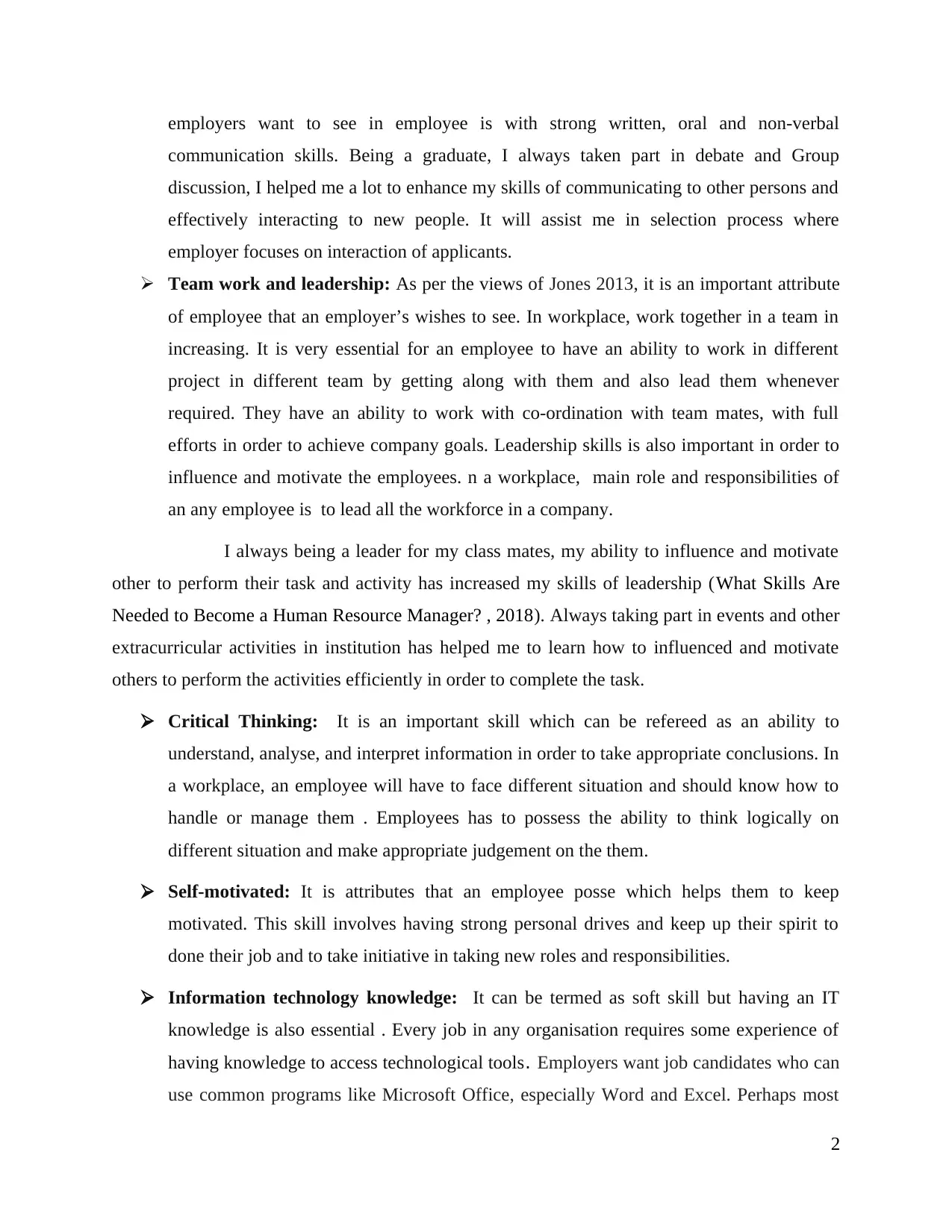
employers want to see in employee is with strong written, oral and non-verbal
communication skills. Being a graduate, I always taken part in debate and Group
discussion, I helped me a lot to enhance my skills of communicating to other persons and
effectively interacting to new people. It will assist me in selection process where
employer focuses on interaction of applicants.
Team work and leadership: As per the views of Jones 2013, it is an important attribute
of employee that an employer’s wishes to see. In workplace, work together in a team in
increasing. It is very essential for an employee to have an ability to work in different
project in different team by getting along with them and also lead them whenever
required. They have an ability to work with co-ordination with team mates, with full
efforts in order to achieve company goals. Leadership skills is also important in order to
influence and motivate the employees. n a workplace, main role and responsibilities of
an any employee is to lead all the workforce in a company.
I always being a leader for my class mates, my ability to influence and motivate
other to perform their task and activity has increased my skills of leadership (What Skills Are
Needed to Become a Human Resource Manager? , 2018). Always taking part in events and other
extracurricular activities in institution has helped me to learn how to influenced and motivate
others to perform the activities efficiently in order to complete the task.
Critical Thinking: It is an important skill which can be refereed as an ability to
understand, analyse, and interpret information in order to take appropriate conclusions. In
a workplace, an employee will have to face different situation and should know how to
handle or manage them . Employees has to possess the ability to think logically on
different situation and make appropriate judgement on the them.
Self-motivated: It is attributes that an employee posse which helps them to keep
motivated. This skill involves having strong personal drives and keep up their spirit to
done their job and to take initiative in taking new roles and responsibilities.
Information technology knowledge: It can be termed as soft skill but having an IT
knowledge is also essential . Every job in any organisation requires some experience of
having knowledge to access technological tools. Employers want job candidates who can
use common programs like Microsoft Office, especially Word and Excel. Perhaps most
2
communication skills. Being a graduate, I always taken part in debate and Group
discussion, I helped me a lot to enhance my skills of communicating to other persons and
effectively interacting to new people. It will assist me in selection process where
employer focuses on interaction of applicants.
Team work and leadership: As per the views of Jones 2013, it is an important attribute
of employee that an employer’s wishes to see. In workplace, work together in a team in
increasing. It is very essential for an employee to have an ability to work in different
project in different team by getting along with them and also lead them whenever
required. They have an ability to work with co-ordination with team mates, with full
efforts in order to achieve company goals. Leadership skills is also important in order to
influence and motivate the employees. n a workplace, main role and responsibilities of
an any employee is to lead all the workforce in a company.
I always being a leader for my class mates, my ability to influence and motivate
other to perform their task and activity has increased my skills of leadership (What Skills Are
Needed to Become a Human Resource Manager? , 2018). Always taking part in events and other
extracurricular activities in institution has helped me to learn how to influenced and motivate
others to perform the activities efficiently in order to complete the task.
Critical Thinking: It is an important skill which can be refereed as an ability to
understand, analyse, and interpret information in order to take appropriate conclusions. In
a workplace, an employee will have to face different situation and should know how to
handle or manage them . Employees has to possess the ability to think logically on
different situation and make appropriate judgement on the them.
Self-motivated: It is attributes that an employee posse which helps them to keep
motivated. This skill involves having strong personal drives and keep up their spirit to
done their job and to take initiative in taking new roles and responsibilities.
Information technology knowledge: It can be termed as soft skill but having an IT
knowledge is also essential . Every job in any organisation requires some experience of
having knowledge to access technological tools. Employers want job candidates who can
use common programs like Microsoft Office, especially Word and Excel. Perhaps most
2
Paraphrase This Document
Need a fresh take? Get an instant paraphrase of this document with our AI Paraphraser
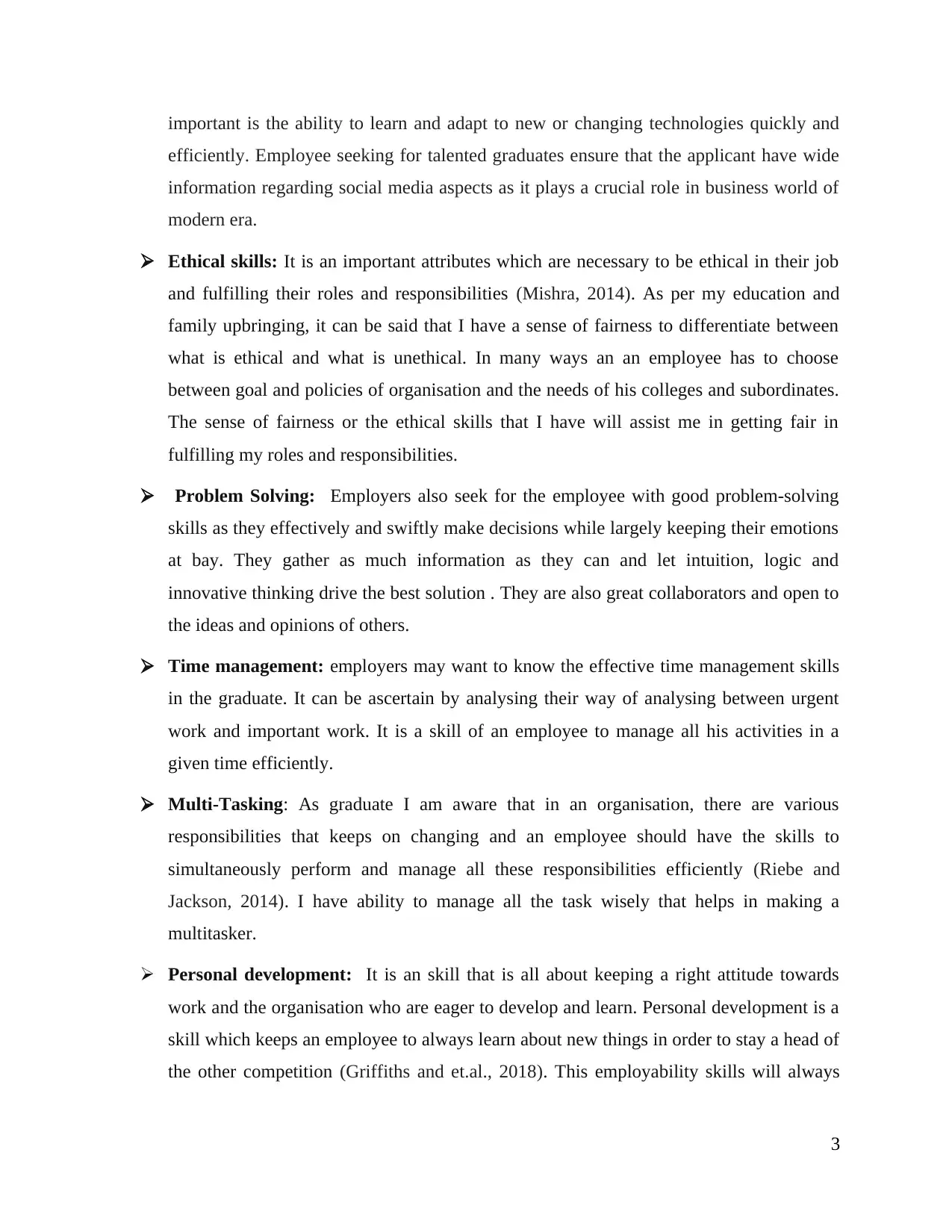
important is the ability to learn and adapt to new or changing technologies quickly and
efficiently. Employee seeking for talented graduates ensure that the applicant have wide
information regarding social media aspects as it plays a crucial role in business world of
modern era.
Ethical skills: It is an important attributes which are necessary to be ethical in their job
and fulfilling their roles and responsibilities (Mishra, 2014). As per my education and
family upbringing, it can be said that I have a sense of fairness to differentiate between
what is ethical and what is unethical. In many ways an an employee has to choose
between goal and policies of organisation and the needs of his colleges and subordinates.
The sense of fairness or the ethical skills that I have will assist me in getting fair in
fulfilling my roles and responsibilities.
Problem Solving: Employers also seek for the employee with good problem-solving
skills as they effectively and swiftly make decisions while largely keeping their emotions
at bay. They gather as much information as they can and let intuition, logic and
innovative thinking drive the best solution . They are also great collaborators and open to
the ideas and opinions of others.
Time management: employers may want to know the effective time management skills
in the graduate. It can be ascertain by analysing their way of analysing between urgent
work and important work. It is a skill of an employee to manage all his activities in a
given time efficiently.
Multi-Tasking: As graduate I am aware that in an organisation, there are various
responsibilities that keeps on changing and an employee should have the skills to
simultaneously perform and manage all these responsibilities efficiently (Riebe and
Jackson, 2014). I have ability to manage all the task wisely that helps in making a
multitasker.
Personal development: It is an skill that is all about keeping a right attitude towards
work and the organisation who are eager to develop and learn. Personal development is a
skill which keeps an employee to always learn about new things in order to stay a head of
the other competition (Griffiths and et.al., 2018). This employability skills will always
3
efficiently. Employee seeking for talented graduates ensure that the applicant have wide
information regarding social media aspects as it plays a crucial role in business world of
modern era.
Ethical skills: It is an important attributes which are necessary to be ethical in their job
and fulfilling their roles and responsibilities (Mishra, 2014). As per my education and
family upbringing, it can be said that I have a sense of fairness to differentiate between
what is ethical and what is unethical. In many ways an an employee has to choose
between goal and policies of organisation and the needs of his colleges and subordinates.
The sense of fairness or the ethical skills that I have will assist me in getting fair in
fulfilling my roles and responsibilities.
Problem Solving: Employers also seek for the employee with good problem-solving
skills as they effectively and swiftly make decisions while largely keeping their emotions
at bay. They gather as much information as they can and let intuition, logic and
innovative thinking drive the best solution . They are also great collaborators and open to
the ideas and opinions of others.
Time management: employers may want to know the effective time management skills
in the graduate. It can be ascertain by analysing their way of analysing between urgent
work and important work. It is a skill of an employee to manage all his activities in a
given time efficiently.
Multi-Tasking: As graduate I am aware that in an organisation, there are various
responsibilities that keeps on changing and an employee should have the skills to
simultaneously perform and manage all these responsibilities efficiently (Riebe and
Jackson, 2014). I have ability to manage all the task wisely that helps in making a
multitasker.
Personal development: It is an skill that is all about keeping a right attitude towards
work and the organisation who are eager to develop and learn. Personal development is a
skill which keeps an employee to always learn about new things in order to stay a head of
the other competition (Griffiths and et.al., 2018). This employability skills will always
3
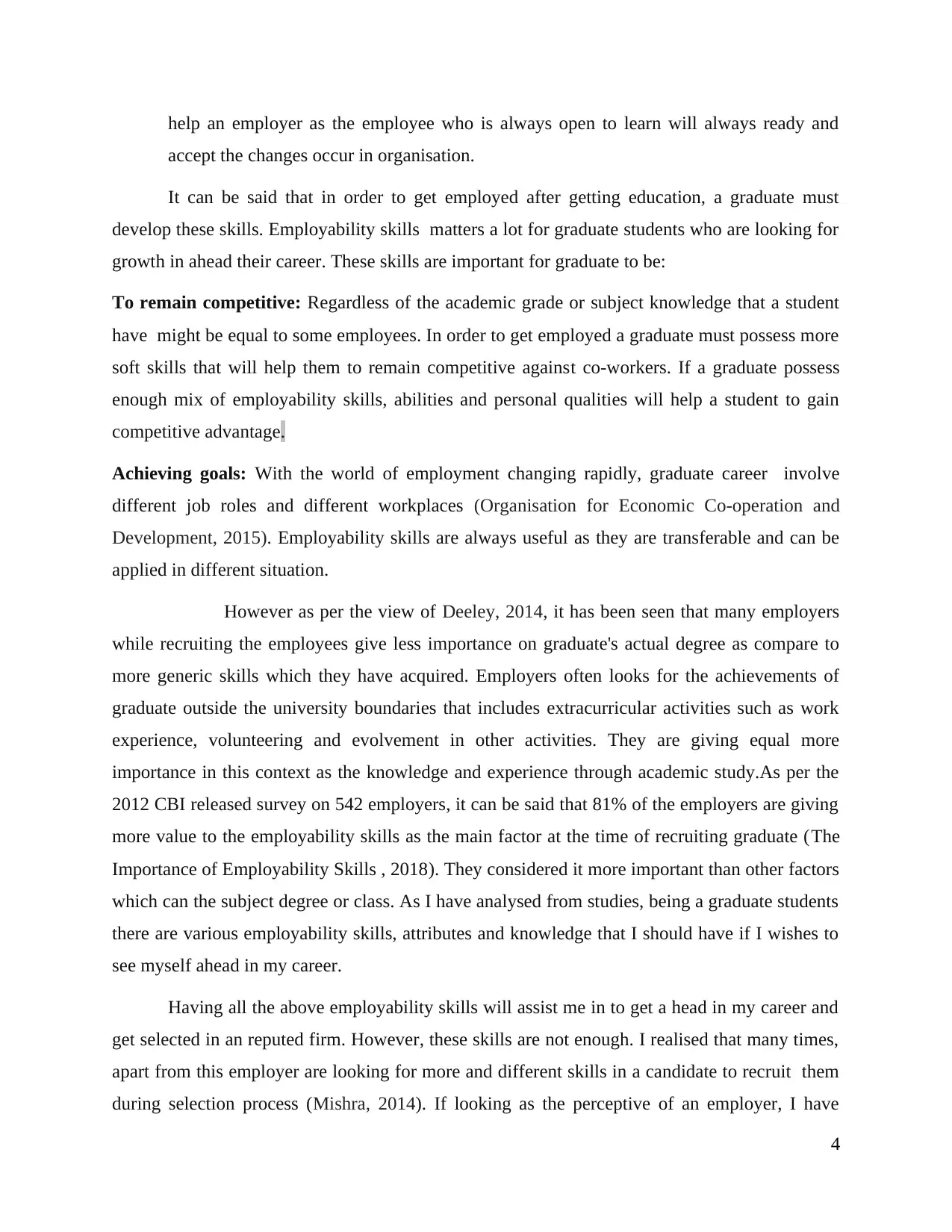
help an employer as the employee who is always open to learn will always ready and
accept the changes occur in organisation.
It can be said that in order to get employed after getting education, a graduate must
develop these skills. Employability skills matters a lot for graduate students who are looking for
growth in ahead their career. These skills are important for graduate to be:
To remain competitive: Regardless of the academic grade or subject knowledge that a student
have might be equal to some employees. In order to get employed a graduate must possess more
soft skills that will help them to remain competitive against co-workers. If a graduate possess
enough mix of employability skills, abilities and personal qualities will help a student to gain
competitive advantage.
Achieving goals: With the world of employment changing rapidly, graduate career involve
different job roles and different workplaces (Organisation for Economic Co-operation and
Development, 2015). Employability skills are always useful as they are transferable and can be
applied in different situation.
However as per the view of Deeley, 2014, it has been seen that many employers
while recruiting the employees give less importance on graduate's actual degree as compare to
more generic skills which they have acquired. Employers often looks for the achievements of
graduate outside the university boundaries that includes extracurricular activities such as work
experience, volunteering and evolvement in other activities. They are giving equal more
importance in this context as the knowledge and experience through academic study.As per the
2012 CBI released survey on 542 employers, it can be said that 81% of the employers are giving
more value to the employability skills as the main factor at the time of recruiting graduate (The
Importance of Employability Skills , 2018). They considered it more important than other factors
which can the subject degree or class. As I have analysed from studies, being a graduate students
there are various employability skills, attributes and knowledge that I should have if I wishes to
see myself ahead in my career.
Having all the above employability skills will assist me in to get a head in my career and
get selected in an reputed firm. However, these skills are not enough. I realised that many times,
apart from this employer are looking for more and different skills in a candidate to recruit them
during selection process (Mishra, 2014). If looking as the perceptive of an employer, I have
4
accept the changes occur in organisation.
It can be said that in order to get employed after getting education, a graduate must
develop these skills. Employability skills matters a lot for graduate students who are looking for
growth in ahead their career. These skills are important for graduate to be:
To remain competitive: Regardless of the academic grade or subject knowledge that a student
have might be equal to some employees. In order to get employed a graduate must possess more
soft skills that will help them to remain competitive against co-workers. If a graduate possess
enough mix of employability skills, abilities and personal qualities will help a student to gain
competitive advantage.
Achieving goals: With the world of employment changing rapidly, graduate career involve
different job roles and different workplaces (Organisation for Economic Co-operation and
Development, 2015). Employability skills are always useful as they are transferable and can be
applied in different situation.
However as per the view of Deeley, 2014, it has been seen that many employers
while recruiting the employees give less importance on graduate's actual degree as compare to
more generic skills which they have acquired. Employers often looks for the achievements of
graduate outside the university boundaries that includes extracurricular activities such as work
experience, volunteering and evolvement in other activities. They are giving equal more
importance in this context as the knowledge and experience through academic study.As per the
2012 CBI released survey on 542 employers, it can be said that 81% of the employers are giving
more value to the employability skills as the main factor at the time of recruiting graduate (The
Importance of Employability Skills , 2018). They considered it more important than other factors
which can the subject degree or class. As I have analysed from studies, being a graduate students
there are various employability skills, attributes and knowledge that I should have if I wishes to
see myself ahead in my career.
Having all the above employability skills will assist me in to get a head in my career and
get selected in an reputed firm. However, these skills are not enough. I realised that many times,
apart from this employer are looking for more and different skills in a candidate to recruit them
during selection process (Mishra, 2014). If looking as the perceptive of an employer, I have
4
⊘ This is a preview!⊘
Do you want full access?
Subscribe today to unlock all pages.

Trusted by 1+ million students worldwide
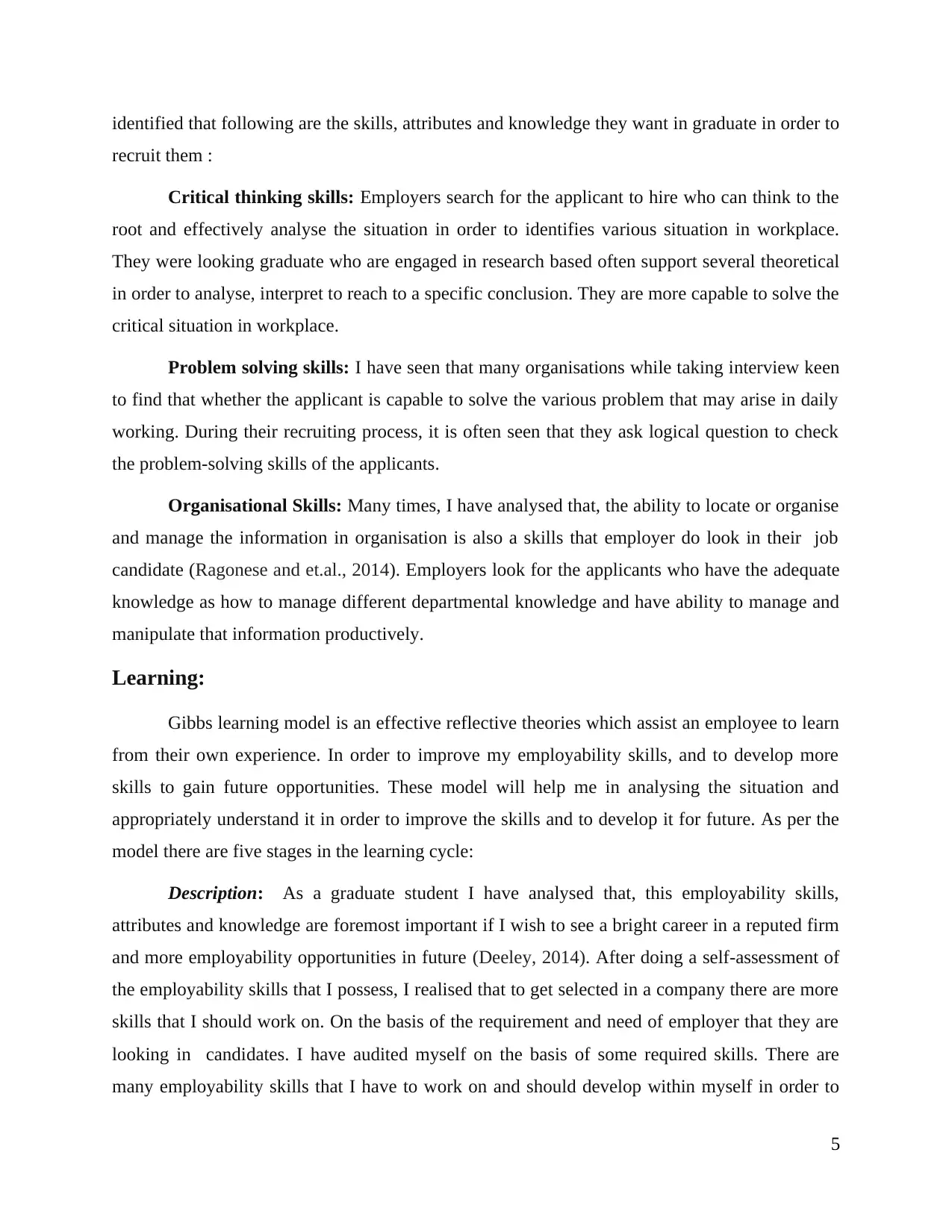
identified that following are the skills, attributes and knowledge they want in graduate in order to
recruit them :
Critical thinking skills: Employers search for the applicant to hire who can think to the
root and effectively analyse the situation in order to identifies various situation in workplace.
They were looking graduate who are engaged in research based often support several theoretical
in order to analyse, interpret to reach to a specific conclusion. They are more capable to solve the
critical situation in workplace.
Problem solving skills: I have seen that many organisations while taking interview keen
to find that whether the applicant is capable to solve the various problem that may arise in daily
working. During their recruiting process, it is often seen that they ask logical question to check
the problem-solving skills of the applicants.
Organisational Skills: Many times, I have analysed that, the ability to locate or organise
and manage the information in organisation is also a skills that employer do look in their job
candidate (Ragonese and et.al., 2014). Employers look for the applicants who have the adequate
knowledge as how to manage different departmental knowledge and have ability to manage and
manipulate that information productively.
Learning:
Gibbs learning model is an effective reflective theories which assist an employee to learn
from their own experience. In order to improve my employability skills, and to develop more
skills to gain future opportunities. These model will help me in analysing the situation and
appropriately understand it in order to improve the skills and to develop it for future. As per the
model there are five stages in the learning cycle:
Description: As a graduate student I have analysed that, this employability skills,
attributes and knowledge are foremost important if I wish to see a bright career in a reputed firm
and more employability opportunities in future (Deeley, 2014). After doing a self-assessment of
the employability skills that I possess, I realised that to get selected in a company there are more
skills that I should work on. On the basis of the requirement and need of employer that they are
looking in candidates. I have audited myself on the basis of some required skills. There are
many employability skills that I have to work on and should develop within myself in order to
5
recruit them :
Critical thinking skills: Employers search for the applicant to hire who can think to the
root and effectively analyse the situation in order to identifies various situation in workplace.
They were looking graduate who are engaged in research based often support several theoretical
in order to analyse, interpret to reach to a specific conclusion. They are more capable to solve the
critical situation in workplace.
Problem solving skills: I have seen that many organisations while taking interview keen
to find that whether the applicant is capable to solve the various problem that may arise in daily
working. During their recruiting process, it is often seen that they ask logical question to check
the problem-solving skills of the applicants.
Organisational Skills: Many times, I have analysed that, the ability to locate or organise
and manage the information in organisation is also a skills that employer do look in their job
candidate (Ragonese and et.al., 2014). Employers look for the applicants who have the adequate
knowledge as how to manage different departmental knowledge and have ability to manage and
manipulate that information productively.
Learning:
Gibbs learning model is an effective reflective theories which assist an employee to learn
from their own experience. In order to improve my employability skills, and to develop more
skills to gain future opportunities. These model will help me in analysing the situation and
appropriately understand it in order to improve the skills and to develop it for future. As per the
model there are five stages in the learning cycle:
Description: As a graduate student I have analysed that, this employability skills,
attributes and knowledge are foremost important if I wish to see a bright career in a reputed firm
and more employability opportunities in future (Deeley, 2014). After doing a self-assessment of
the employability skills that I possess, I realised that to get selected in a company there are more
skills that I should work on. On the basis of the requirement and need of employer that they are
looking in candidates. I have audited myself on the basis of some required skills. There are
many employability skills that I have to work on and should develop within myself in order to
5
Paraphrase This Document
Need a fresh take? Get an instant paraphrase of this document with our AI Paraphraser
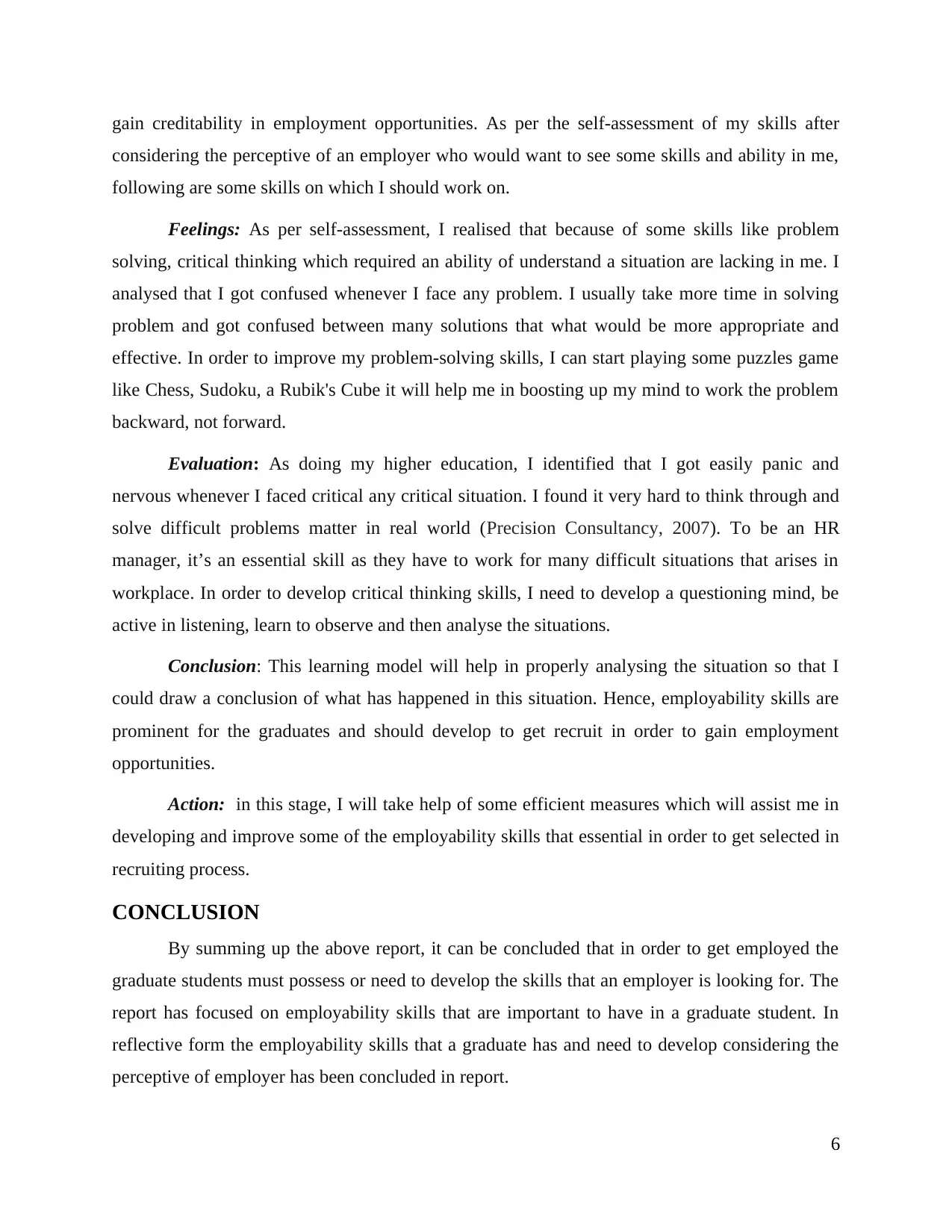
gain creditability in employment opportunities. As per the self-assessment of my skills after
considering the perceptive of an employer who would want to see some skills and ability in me,
following are some skills on which I should work on.
Feelings: As per self-assessment, I realised that because of some skills like problem
solving, critical thinking which required an ability of understand a situation are lacking in me. I
analysed that I got confused whenever I face any problem. I usually take more time in solving
problem and got confused between many solutions that what would be more appropriate and
effective. In order to improve my problem-solving skills, I can start playing some puzzles game
like Chess, Sudoku, a Rubik's Cube it will help me in boosting up my mind to work the problem
backward, not forward.
Evaluation: As doing my higher education, I identified that I got easily panic and
nervous whenever I faced critical any critical situation. I found it very hard to think through and
solve difficult problems matter in real world (Precision Consultancy, 2007). To be an HR
manager, it’s an essential skill as they have to work for many difficult situations that arises in
workplace. In order to develop critical thinking skills, I need to develop a questioning mind, be
active in listening, learn to observe and then analyse the situations.
Conclusion: This learning model will help in properly analysing the situation so that I
could draw a conclusion of what has happened in this situation. Hence, employability skills are
prominent for the graduates and should develop to get recruit in order to gain employment
opportunities.
Action: in this stage, I will take help of some efficient measures which will assist me in
developing and improve some of the employability skills that essential in order to get selected in
recruiting process.
CONCLUSION
By summing up the above report, it can be concluded that in order to get employed the
graduate students must possess or need to develop the skills that an employer is looking for. The
report has focused on employability skills that are important to have in a graduate student. In
reflective form the employability skills that a graduate has and need to develop considering the
perceptive of employer has been concluded in report.
6
considering the perceptive of an employer who would want to see some skills and ability in me,
following are some skills on which I should work on.
Feelings: As per self-assessment, I realised that because of some skills like problem
solving, critical thinking which required an ability of understand a situation are lacking in me. I
analysed that I got confused whenever I face any problem. I usually take more time in solving
problem and got confused between many solutions that what would be more appropriate and
effective. In order to improve my problem-solving skills, I can start playing some puzzles game
like Chess, Sudoku, a Rubik's Cube it will help me in boosting up my mind to work the problem
backward, not forward.
Evaluation: As doing my higher education, I identified that I got easily panic and
nervous whenever I faced critical any critical situation. I found it very hard to think through and
solve difficult problems matter in real world (Precision Consultancy, 2007). To be an HR
manager, it’s an essential skill as they have to work for many difficult situations that arises in
workplace. In order to develop critical thinking skills, I need to develop a questioning mind, be
active in listening, learn to observe and then analyse the situations.
Conclusion: This learning model will help in properly analysing the situation so that I
could draw a conclusion of what has happened in this situation. Hence, employability skills are
prominent for the graduates and should develop to get recruit in order to gain employment
opportunities.
Action: in this stage, I will take help of some efficient measures which will assist me in
developing and improve some of the employability skills that essential in order to get selected in
recruiting process.
CONCLUSION
By summing up the above report, it can be concluded that in order to get employed the
graduate students must possess or need to develop the skills that an employer is looking for. The
report has focused on employability skills that are important to have in a graduate student. In
reflective form the employability skills that a graduate has and need to develop considering the
perceptive of employer has been concluded in report.
6
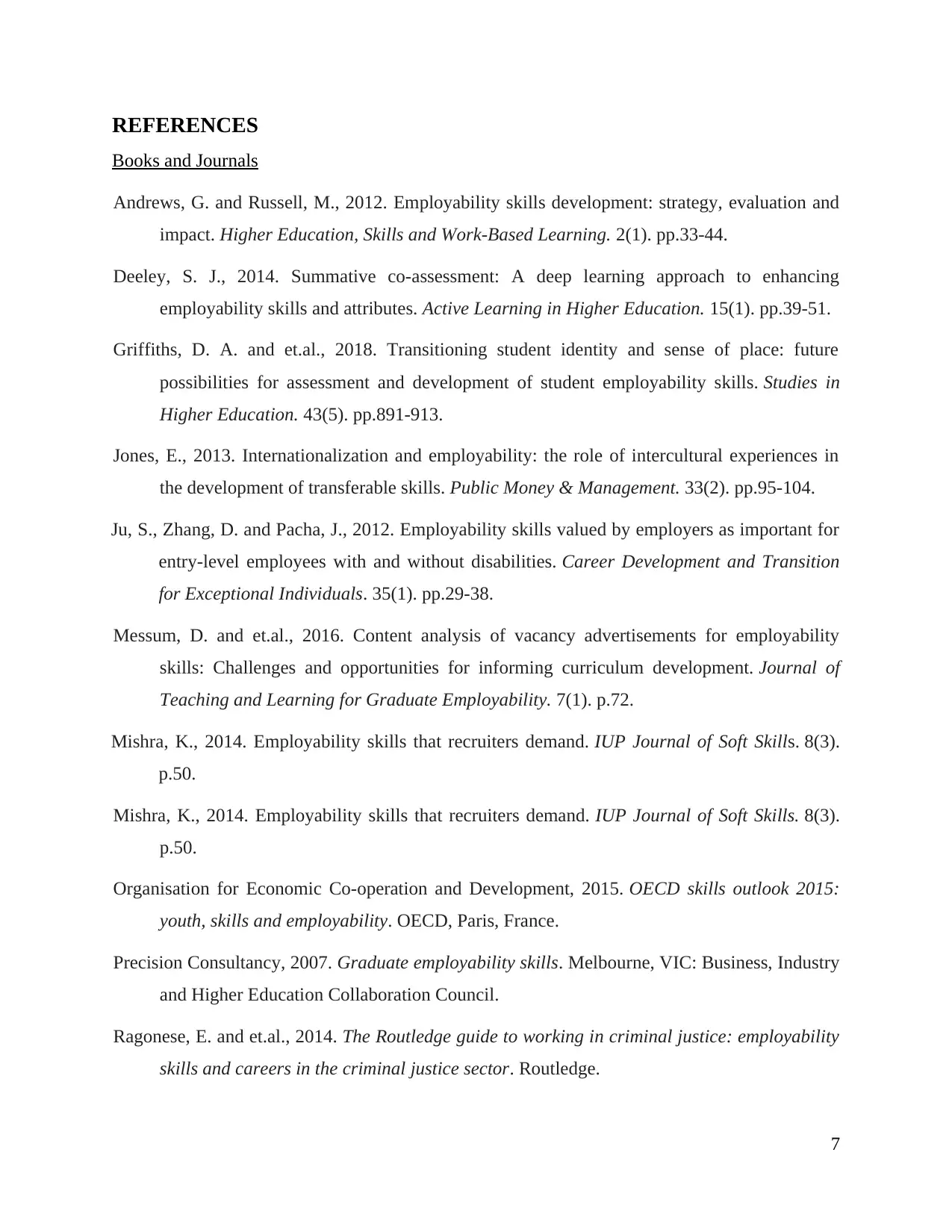
REFERENCES
Books and Journals
Andrews, G. and Russell, M., 2012. Employability skills development: strategy, evaluation and
impact. Higher Education, Skills and Work-Based Learning. 2(1). pp.33-44.
Deeley, S. J., 2014. Summative co-assessment: A deep learning approach to enhancing
employability skills and attributes. Active Learning in Higher Education. 15(1). pp.39-51.
Griffiths, D. A. and et.al., 2018. Transitioning student identity and sense of place: future
possibilities for assessment and development of student employability skills. Studies in
Higher Education. 43(5). pp.891-913.
Jones, E., 2013. Internationalization and employability: the role of intercultural experiences in
the development of transferable skills. Public Money & Management. 33(2). pp.95-104.
Ju, S., Zhang, D. and Pacha, J., 2012. Employability skills valued by employers as important for
entry-level employees with and without disabilities. Career Development and Transition
for Exceptional Individuals. 35(1). pp.29-38.
Messum, D. and et.al., 2016. Content analysis of vacancy advertisements for employability
skills: Challenges and opportunities for informing curriculum development. Journal of
Teaching and Learning for Graduate Employability. 7(1). p.72.
Mishra, K., 2014. Employability skills that recruiters demand. IUP Journal of Soft Skills. 8(3).
p.50.
Mishra, K., 2014. Employability skills that recruiters demand. IUP Journal of Soft Skills. 8(3).
p.50.
Organisation for Economic Co-operation and Development, 2015. OECD skills outlook 2015:
youth, skills and employability. OECD, Paris, France.
Precision Consultancy, 2007. Graduate employability skills. Melbourne, VIC: Business, Industry
and Higher Education Collaboration Council.
Ragonese, E. and et.al., 2014. The Routledge guide to working in criminal justice: employability
skills and careers in the criminal justice sector. Routledge.
7
Books and Journals
Andrews, G. and Russell, M., 2012. Employability skills development: strategy, evaluation and
impact. Higher Education, Skills and Work-Based Learning. 2(1). pp.33-44.
Deeley, S. J., 2014. Summative co-assessment: A deep learning approach to enhancing
employability skills and attributes. Active Learning in Higher Education. 15(1). pp.39-51.
Griffiths, D. A. and et.al., 2018. Transitioning student identity and sense of place: future
possibilities for assessment and development of student employability skills. Studies in
Higher Education. 43(5). pp.891-913.
Jones, E., 2013. Internationalization and employability: the role of intercultural experiences in
the development of transferable skills. Public Money & Management. 33(2). pp.95-104.
Ju, S., Zhang, D. and Pacha, J., 2012. Employability skills valued by employers as important for
entry-level employees with and without disabilities. Career Development and Transition
for Exceptional Individuals. 35(1). pp.29-38.
Messum, D. and et.al., 2016. Content analysis of vacancy advertisements for employability
skills: Challenges and opportunities for informing curriculum development. Journal of
Teaching and Learning for Graduate Employability. 7(1). p.72.
Mishra, K., 2014. Employability skills that recruiters demand. IUP Journal of Soft Skills. 8(3).
p.50.
Mishra, K., 2014. Employability skills that recruiters demand. IUP Journal of Soft Skills. 8(3).
p.50.
Organisation for Economic Co-operation and Development, 2015. OECD skills outlook 2015:
youth, skills and employability. OECD, Paris, France.
Precision Consultancy, 2007. Graduate employability skills. Melbourne, VIC: Business, Industry
and Higher Education Collaboration Council.
Ragonese, E. and et.al., 2014. The Routledge guide to working in criminal justice: employability
skills and careers in the criminal justice sector. Routledge.
7
⊘ This is a preview!⊘
Do you want full access?
Subscribe today to unlock all pages.

Trusted by 1+ million students worldwide
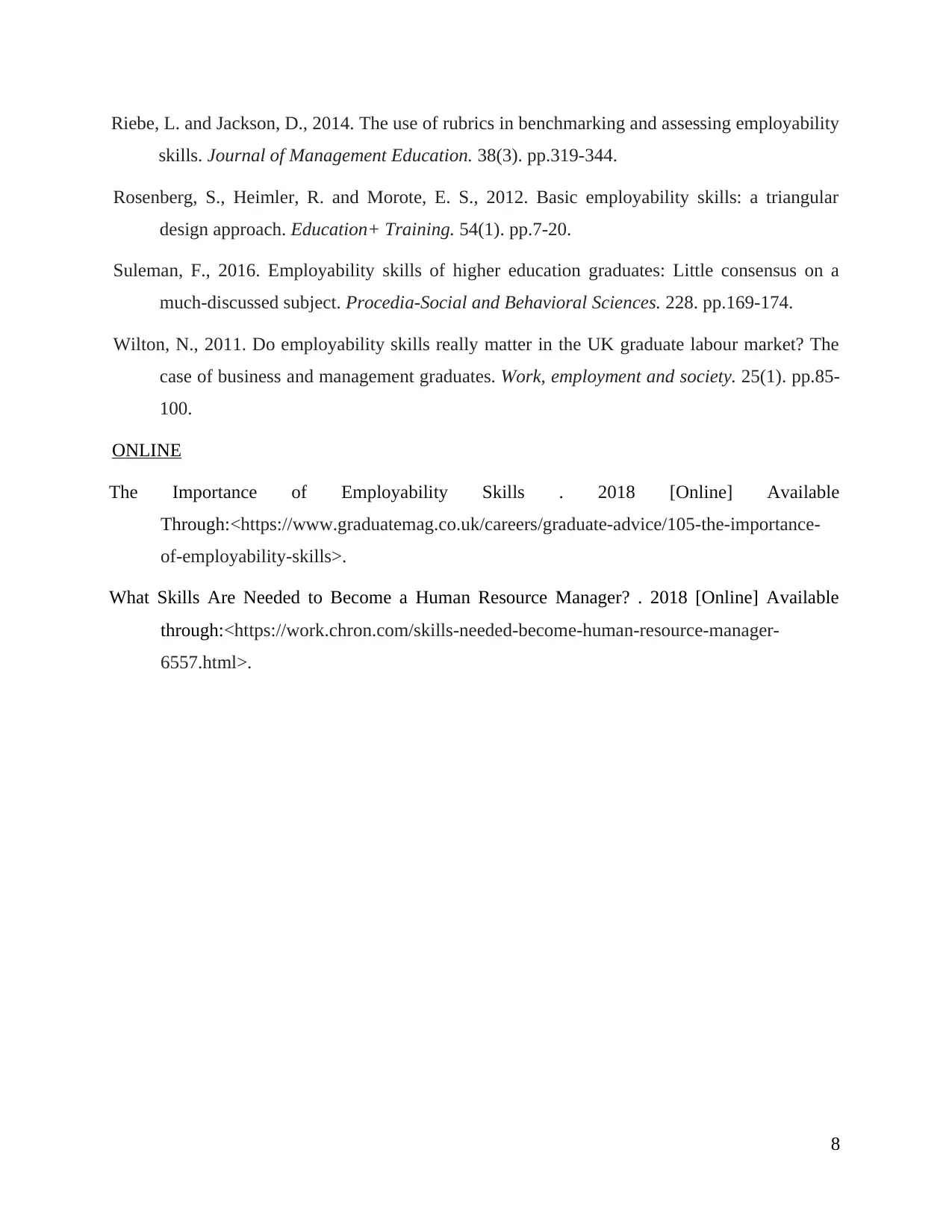
Riebe, L. and Jackson, D., 2014. The use of rubrics in benchmarking and assessing employability
skills. Journal of Management Education. 38(3). pp.319-344.
Rosenberg, S., Heimler, R. and Morote, E. S., 2012. Basic employability skills: a triangular
design approach. Education+ Training. 54(1). pp.7-20.
Suleman, F., 2016. Employability skills of higher education graduates: Little consensus on a
much-discussed subject. Procedia-Social and Behavioral Sciences. 228. pp.169-174.
Wilton, N., 2011. Do employability skills really matter in the UK graduate labour market? The
case of business and management graduates. Work, employment and society. 25(1). pp.85-
100.
ONLINE
The Importance of Employability Skills . 2018 [Online] Available
Through:<https://www.graduatemag.co.uk/careers/graduate-advice/105-the-importance-
of-employability-skills>.
What Skills Are Needed to Become a Human Resource Manager? . 2018 [Online] Available
through:<https://work.chron.com/skills-needed-become-human-resource-manager-
6557.html>.
8
skills. Journal of Management Education. 38(3). pp.319-344.
Rosenberg, S., Heimler, R. and Morote, E. S., 2012. Basic employability skills: a triangular
design approach. Education+ Training. 54(1). pp.7-20.
Suleman, F., 2016. Employability skills of higher education graduates: Little consensus on a
much-discussed subject. Procedia-Social and Behavioral Sciences. 228. pp.169-174.
Wilton, N., 2011. Do employability skills really matter in the UK graduate labour market? The
case of business and management graduates. Work, employment and society. 25(1). pp.85-
100.
ONLINE
The Importance of Employability Skills . 2018 [Online] Available
Through:<https://www.graduatemag.co.uk/careers/graduate-advice/105-the-importance-
of-employability-skills>.
What Skills Are Needed to Become a Human Resource Manager? . 2018 [Online] Available
through:<https://work.chron.com/skills-needed-become-human-resource-manager-
6557.html>.
8
1 out of 10
Related Documents
Your All-in-One AI-Powered Toolkit for Academic Success.
+13062052269
info@desklib.com
Available 24*7 on WhatsApp / Email
![[object Object]](/_next/static/media/star-bottom.7253800d.svg)
Unlock your academic potential
Copyright © 2020–2026 A2Z Services. All Rights Reserved. Developed and managed by ZUCOL.





